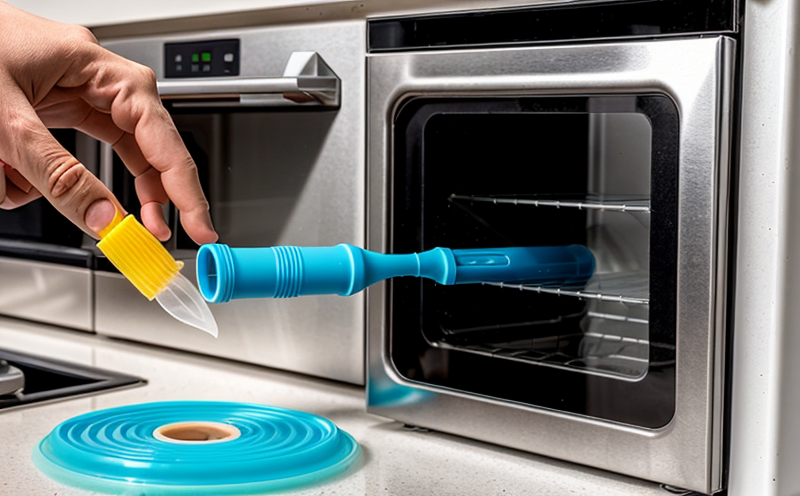ASTM D882 Tensile Testing of Household Plastic Films
The ASTM D882 standard is a crucial method used in the characterization of household plastic films, particularly those intended for packaging. This test focuses on determining the tensile properties, which are essential to understanding how these materials will perform under various loading conditions. The significance of this testing lies in its ability to predict the durability and reliability of the product, ensuring that it meets both performance expectations and regulatory requirements.
For household plastic films like those used for food packaging or containers, tensile strength is a key property that influences the film's resistance to rupture during handling. The test involves applying a controlled force until failure occurs, measuring the maximum stress experienced by the sample before breaking. This information is vital not only for quality assurance but also for product development and compliance with various standards.
The process begins with selecting an appropriate specimen size according to ASTM D882 guidelines. Specimens must be cut from the plastic film using precise methods to ensure uniformity, which can significantly impact test results if done incorrectly. Once prepared, they are mounted in a tensile testing machine calibrated per relevant standards such as ISO 528 or EN ISO 178.
The test itself proceeds by gradually increasing the load at a specified rate until the specimen fails. During this process, data including stress, strain, and elongation at break are recorded. These measurements provide insights into not just tensile strength but also flexibility and toughness of the plastic film. Understanding these parameters helps manufacturers optimize their formulations to balance between strength and flexibility, crucial for applications where both attributes play significant roles.
Another important aspect is the environmental impact associated with household plastics. Testing like ASTM D882 contributes by providing data that can guide improvements in material composition towards more sustainable options. For instance, higher tensile strengths could lead to thinner films without compromising on performance, reducing resource consumption and waste generation throughout the lifecycle of such products.
- Emissions reduction during production processes
- Minimized energy use due to lighter materials
- Better recyclability attributes leading to less landfill burden
- Potential for creating biodegradable alternatives if testing supports innovation in this direction
In summary, ASTM D882 tensile testing is a cornerstone of quality control and product development for household plastic films. It ensures that the materials used are fit for their intended purposes while paving the way for more sustainable practices within the industry.
Why It Matters
The importance of ASTM D882 tensile testing extends beyond mere compliance; it represents a critical step in ensuring product reliability and consumer safety. By accurately measuring the mechanical properties of household plastic films, this test helps prevent potential hazards associated with substandard materials entering the market.
For instance, improperly designed packaging could lead to accidental spills or leaks when handling food products, posing risks to both consumers and businesses alike. Furthermore, poor quality films might degrade prematurely under normal storage conditions, resulting in wasted resources and increased costs for manufacturers. Through rigorous testing like ASTM D882, these issues can be identified early on, allowing for timely corrections before reaching the end-user.
Moreover, this test plays a vital role in upholding industry standards and fostering trust among all stakeholders involved—from raw material suppliers to final consumers. Compliance with such tests not only protects against legal repercussions but also enhances brand reputation by demonstrating commitment to excellence. In today’s competitive marketplace, maintaining high-quality standards is essential for long-term success.
By leveraging accurate tensile testing data from ASTM D882, companies can make informed decisions regarding their product designs and manufacturing processes. This proactive approach ensures that every step of the production cycle contributes positively towards delivering safe, efficient, and environmentally friendly solutions to end-users.
Why Choose This Test
Selecting ASTM D882 tensile testing for household plastic films offers several advantages over alternative methods. Firstly, it provides comprehensive data on the mechanical properties of these materials, which are essential for assessing their suitability across different applications.
- Tensile Strength: Measures how much force a material can withstand before breaking, crucial for determining packaging integrity and safety.
- Elongation at Break: Indicates the degree to which a material stretches before fracturing, important for flexibility considerations.
- Modulus of Elasticity: Reflects stiffness, helping predict how a film will behave under load.
The precision and reliability offered by ASTM D882 make it an ideal choice for quality assurance departments looking to maintain consistent product performance. Its standardized procedures ensure that results are repeatable across laboratories worldwide, facilitating international trade in materials and products.
Additionally, this test aligns closely with broader sustainability goals within the plastics industry. By optimizing tensile properties while minimizing material usage, manufacturers can reduce their environmental footprint significantly. Furthermore, testing supports efforts towards developing more sustainable alternatives by providing valuable insights into new formulations’ mechanical behavior.
In conclusion, choosing ASTM D882 ensures that household plastic films meet stringent quality criteria and contribute positively to overall sustainability objectives. The depth and accuracy of the data generated make it indispensable for ensuring product reliability and safety while promoting responsible environmental practices.





